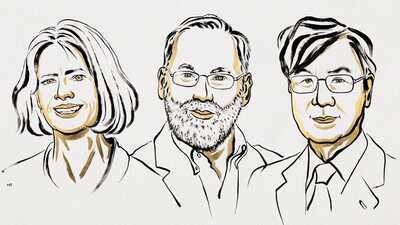
Trio wins Nobel Prize in Medicine for 'immune tolerance' research
06 Oct 2025
The Nobel Prize in Physiology or Medicine has been jointly awarded to Mary E Brunkow, Fred Ramsdell, and Shimon Sakaguchi for their discoveries related to "peripheral immune tolerance."
Their work has advanced our understanding of how the body's immune system is regulated to prevent it from attacking its own organs.
"Their discoveries have laid the foundation for a new field of research and spurred the development of new treatments, for example, for cancer and autoimmune diseases," the prize-awarding body said.
The immune system's role in protecting us from pathogens
Immune defense
The laureates' research on peripheral immune tolerance has revealed the role of a special class of immune cells, called regulatory T cells.
These cells act as guardians against autoimmune diseases.
Every day, our immune system protects us from thousands of invading microbes.
However, many pathogens mimic human cells to evade detection, making it crucial for the immune system to differentiate between foreign threats and its own tissues.
Sakaguchi's groundbreaking work in the field
Research evolution
In 1995, Shimon Sakaguchi challenged the prevailing view that immune tolerance was solely maintained by eliminating harmful immune cells in the thymus.
His research showed that the immune system was more complex than previously thought and identified an entirely new type of immune cell, regulatory T cells.
These were found to protect the body from autoimmune disorders, marking a major breakthrough in immunology.
Brunkow and Ramsdell's contributions to the research
Genetic discovery
In 2001, Mary Brunkow and Fred Ramsdell advanced the field through genetic research.
They studied a mouse strain prone to autoimmune disease and discovered a mutation in a gene they named Foxp3.
This mutation disabled the immune system's regulatory controls, leading to severe illness.
Notably, they confirmed that mutations in the human equivalent of Foxp3 cause IPEX syndrome, a rare but serious autoimmune condition.
Role of Foxp3 gene
Gene connection
Two years later, Sakaguchi connected the dots by proving that the Foxp3 gene orchestrates the development of regulatory T cells.
These cells act as immune monitors, ensuring defensive responses target genuine threats while tolerating the body's own tissues.
"Their discoveries have been decisive for our understanding of why we do not all develop serious autoimmune diseases," said Olle Kampe, chair of the Nobel Committee.
Peripheral tolerance and its implications for treatment strategies
Treatment implications
The concept of peripheral tolerance now underpins emerging therapies for autoimmune diseases, cancer, and organ transplantation.
Several Foxp3-based therapies are already in clinical trials, with hopes of improving patient outcomes and enabling more successful transplants.
The 2025 Nobel Prize in Medicine celebrates three scientists whose collaborative breakthroughs have reshaped the fight against immune-related illnesses, offering hope for millions affected by autoimmune and inflammatory diseases worldwide.